5 tips for preventing a kitchen fire over the holidays
Keep the flambéing in the pan
Products are chosen independently by our editors. Purchases made through our links may earn us a commission.
It's the thick of the holiday season, and your kitchen may be more high traffic than a runway this time of year. Your friends and family gather for toddies and conversation or a holiday feast. And, while you’re busy trying to entertain and put food on the table, mistakes can happen that are costly.
You’re in your kitchen every day whipping up meals, so you may not stop to think of it as being a place of danger in your home. However, according to the National Fire Protection Association, kitchen fires are the leading cause of home fires in the U.S., so no matter how comfortable you are in the kitchen, it pays to be careful.
“Especially during the holidays, the kitchen is the heart of the home,” says Alex Forte, The Home Depot’s fire safety merchant. Forte is a pro at preparing homeowners for fire safety, and we asked him to give us his best tips to prevent kitchen fires from breaking out during the holiday season and beyond.
1. Don’t let your dress sleeve dangle in flames
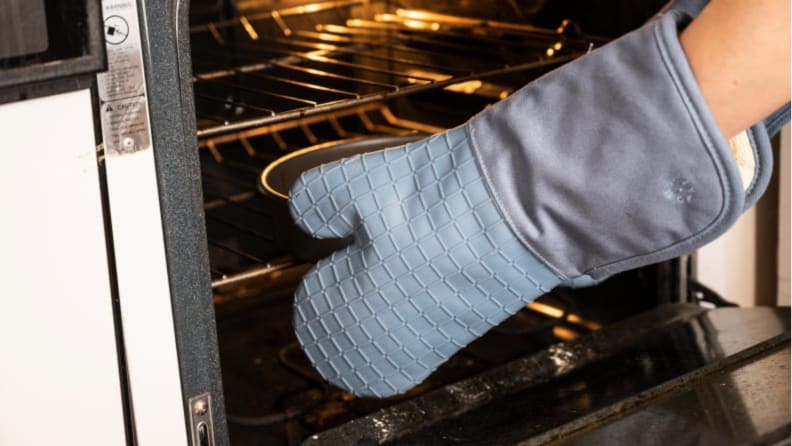
A misplaced mitt on a burner can end in flames.
While you may want to dress to impress your holiday guests, be wary of wearing a holiday outfit that has loose sleeves and hems. These can easily catch fire if they were to come into contact with your stovetop. If you do dress up, roll up your sleeves as you’re stirring and sautéing.
Not to mention, it’s smart to throw on an apron, which can cinch in any flowing fabric and offer some level of fire resistance.
You can pair the apron with a good pair of oven mitts to protect your hands and upper arms as you’re reaching in and out of the oven, just be careful, says Forte. “Keep combustible materials away from cooking flames, including potholders, oven mitts, wooden utensils, and dish towels.” A misplaced mitt on a burner can end in flames.
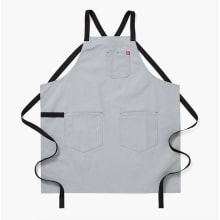
Our favorite apron is fire-resistant and built to last.
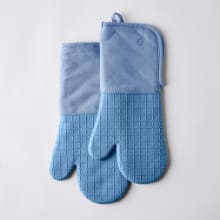
These well-designed mitts will protect your hands even with ultra-high temperatures.
2. Keep fire extinguishing tools at hand
While you always want to avoid a fire, you want to be prepared for the worst. Keeping some crucial tools on hand and knowing the proper way to use them will prevent kitchen mishaps from becoming disasters.
Two items that will come in handy at the first site of flames are a fire extinguisher and a fire blanket. These can be tucked away in the cupboard until you need them the most.
A fire blanket is the most straightforward to use since it involves less aim as you suffocate the flames with the blanket before turning off the heat source.
“A fire extinguisher,” says Forte, “can be lifesaving when water cannot put out a fire, as is the case with most kitchen fires.”
We’ve tested the best fire extinguishers you can buy, and top honors goes to the Kidde Pro 210.
If you do plan on keeping a fire extinguisher at hand then take the time to learn how to use it. There are instructions on the side of the container, but taking the time to walk through the steps in preparation will help you to feel confident in the face of flames.
(Just be sure not to physically test it out. Once fire extinguishers are used, they gradually lose pressure and may not be as effective when needed in an emergency.)
Extinguishers also have expiration dates on them, so keep track.
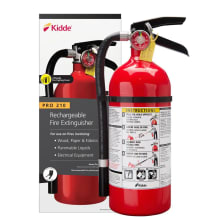
It's always a good idea to keep a fire extinguisher close by in the kitchen.
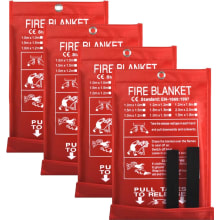
Fire suppression blankets are a reliable method of putting out fires quickly.
3. Clean up stray crumbs and greasy spills
A clean countertop is nice to look at, but it also helps protect your home. “Crumbs in a toaster or grease on the stove can catch on fire,” Forte notes.
Cleaning as you go will help take any flammable debris out of a fire's path. The dirtiest areas of your kitchen include stovetops, ovens, and stove hoods. Take the time to clean up grease spills. Some dish soap can cut through grease stains easily.
Adding a cooktop cleaner to your daily regime will also effectively and routinely remove unwanted grease. When you’re scrubbing away, don’t forget to look up. Range hoods can collect grease too, so wiping away any oily residue leaves less fuel for grease fires.
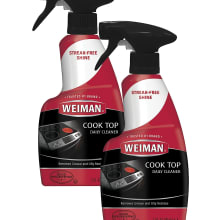
Reduce grease fire risk with reliable cleaning solutions.
4. Don’t overload your outlets
During the holidays you’re working at maximum capacity, so you may be pulling in small appliances to help you get the job done. While the coffee maker, toaster, Instant Pot, and air fryer may feel like generous assistants, pay attention to overloading outlets.
“Overloading wall outlets or power strips may cause an electrical fire, so carefully plan when you will use each one,” Forte says. This is especially relevant in older homes with wiring that isn’t equipped to handle heavy loads.
When your appliances aren’t in use, unplug them. Even if they aren’t powered on, appliances still pull electricity, which can lead to sparks. A little strategizing before you start cooking can help you time out what appliances you need to use, and when.
5. Equip your home with working smoke detectors

To protect your home at the first sign of smoke, a smoke detector can save your life.
No matter how much forethought you put into preparing for the holidays, the unexpected can always happen. To protect your home at the first sign of smoke, a smoke detector can save your life.
“Make sure smoke detectors are installed on every level of your home,” Forte says. You can go for dual smoke and carbon monoxide detectors.
Fire is the obvious danger in your kitchen, but for those with a gas range, a burner can turn into a gas leak in an instant. Smart detectors can verbally alert you to fires and/or carbon monoxide excesses, which means you and your house guests will stay safe over the holidays.
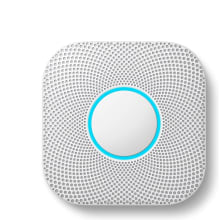
A smart detector will alert you when dangers like gas leaks and smoke can be a danger at home.


